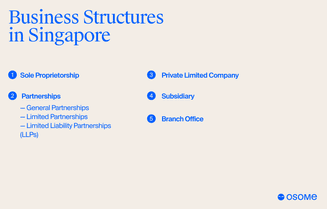A Guide to Company Registration in Singapore From the US: Step-by-Step Process
- Published: 24 September 2024
- 10 min read
- Starting a Company


Heather Cameron
Author
From expert guidance and helpful accounting tips to insights on the latest trends in fintech, Heather is here to empower entrepreneurs and small business owners in Singapore with great content. With a background in digital marketing spanning eight years, she has experience writing for various industries and audiences. As Osome’s copywriter, she’s here to inform and inspire our readers with great storytelling.

Deepti Laddha
Reviewer
Deepti Laddha, our Head of Corporate Operations in Singapore, brings a decade of experience to her role, supporting our business writers in crafting insightful and engaging articles. With a strong background in corporate services, Deepti is a rich source of knowledge and expertise. We can count on her to assist in transforming any definition, concept or complicated jargon into helpful tips that help our readers take their businesses to the next level.
Want to register a company in Singapore? This guide covers the essential steps, from selecting an entity structure to registering with ACRA and complying with requirements. Learn how to set up your business efficiently.
Key Takeaways
- Registering a Singapore company provides legal recognition, enhances credibility, and access to government support programs, which are crucial for business growth and attracting investors.
- The right structure (sole proprietorship, partnership, private limited company, subsidiary, or branch office) is essential for determining liabilities, legal responsibilities, and operational scalability.
- Post-registration requirements include appointing a local company secretary, maintaining statutory records, and fulfilling legal obligations, which ensures compliance and smooth business operation in Singapore.
Understanding the Importance of Company Registration
Registering a business entity in Singapore establishes a legitimate market presence. It provides the legal status as a Singapore company, granting rights and protecting business activities under local laws.
A registered Singapore company enhances its reputation with legally reinforced reliability and stability. Potential clients and investors are more likely to trust and engage with a business registering itself with the corporate regulatory authority.
Singapore companies also benefit from government support programs and tax incentives. These programs offer significant advantages, especially for startups, by providing financial support, training, and networking opportunities for different business activities.
Choosing the Right Business Structure
Choosing the correct business structure affects paperwork, personal liabilities, legal responsibilities, and taxes. This decision affects growth and scalability, determining operational and expansion paths.
Singapore offers various structures for business entities, each with unique advantages and implications: sole proprietorships, partnerships, private limited companies, and branches or subsidiaries of foreign companies. Understanding each structure’s nuances ensures an informed decision aligning with business goals and needs, especially for Singapore companies.

Sole Proprietorship
A sole proprietorship is the simplest business entity, owned and run by one individual. It is ideal for small, low-risk businesses and requires minimal paperwork. all you need is a residential address in Singapore, and you will be good to go.
Sole proprietorships do not exist as separate legal entities, meaning the owner is personally liable for all business debts and obligations. Such unlimited liability can expose personal assets to business risks. Therefore, this structure is often only used by individuals running very small-scale businesses.
Partnerships
Partnerships in Singapore include General Partnerships, Limited Partnerships, and Limited Liability Partnerships (LLPs). In a General Partnership, all partners share unlimited personal liability for the business’s debts, posing significant risks. This structure suits businesses where partners are willing to take on joint responsibility for performance and liabilities.
A Limited Partnership includes both general and limited partners. The liabilities of a limited partner is confined to each partner's investment. Limited partners do not participate in management decisions. Meanwhile, general partners have full management control and unlimited financial liability over the business.
A Limited Liability Partnership combines features of partnerships and companies, offering a separate legal identity to provide partners with additional protection. This structure is favoured by professional services firms and businesses seeking a balance between flexibility and liability separation.
Private Limited Company
A private limited company is popular in Singapore due to its flexibility, scalability, and legal protections. As a private company, this type of entity is controlled by fewer than 50 shareholders and is not publicly tradable. This structure allows pre-selected shareholders to control the company’s direction. Shareholders’ liability is limited to their shares, providing a buffer against personal financial risk.
Typically managed by a board of directors elected by shareholders, this structure ensures collective strategic decision-making and functions as a separate legal entity. This structure is often chosen by businesses aiming for company incorporation.
Private limited companies can enter contracts, own property, and be liable for debts independently of shareholders. This distinction between personal and business assets offers added protection for business owners.
Subsidiary vs. Branch Office
Foreign companies going to enter the Singapore market can choose between a subsidiary company or a branch office. A subsidiary company is a private limited company whose shares are held by the foreign parent company. It operates as a distinct legal entity with independent liabilities and obligations. This structure is preferred for small and medium-sized foreign businesses seeking limited liability and legal advantages.
A branch office is an extension of the parent company overseas, without separate legal entity status, and carries the parent company’s liabilities. This structure can simplify certain administrative processes, but the parent company is directly responsible for the branch’s actions and liabilities.
Since subsidiaries offer greater legal protection and operational flexibility, they are a more attractive option for foreign businesses wanting to register a company in Singapore.
Step-by-Step Guide to Company Registration
The process to register a Singapore company is streamlined to ensure compliance with local regulations and promote growth. It involves two main steps: securing a business name and completing the registration. The company name must be approved by the Accounting and Corporate Regulatory Authority (ACRA), ensuring it is unique and not already in use to avoid delays.
Once the company name is approved, a company must complete the registration process by submitting the required documents and information to ACRA.
Required Documents and Information
Your company's registration in Singapore requires certain documents and information. These include the business commencement date, your company's registered address, and at least one director with a Singapore residential address for partnerships and limited companies.
Ensuring transparency and establishing business legitimacy is crucial when submitting identification details for all shareholders, officers, and beneficial owners.
For foreigners, the process can be complex, but with Osome’s expert services, navigating regulatory compliance is made simple. As a professional filing agent, Osome handles the entire registration process, ensuring you meet all requirements smoothly and efficiently. Feel free to contact us today!
The application for incorporation must be submitted online through BizFile+, a digital platform that streamlines the process for entrepreneurs locally and internationally.

Registration Fee and Timeline
The standard registration fee for a Singapore company is S$ 315, which covers the company name application with ACRA. This fee is a necessary investment in establishing your business presence. The fee can be paid by logging into your business profile via the eBiz portal.
The incorporation process usually takes one to three days once all documentation is ready. However, the overall process can take a few days up to 60 days, depending on factors like documentation completeness and the need for further investigation.
If the proposed company name is not accepted, an appeal process is available, generally taking 14 to 21 working days. Once the company registration is complete, you will receive a business license allowing you to officially conduct business in Singapore.
Post-Registration Requirements
Businesses must meet several post-registration requirements to ensure compliance with local regulations upon registration, including opening a corporate bank account, appointing a company secretary, and creating a standard Singapore company constitution.
Appointing a qualified company secretary within six months post-registration is mandatory. The qualified company secretary fulfils regulatory duties and ensures adherence to local laws. It is also mandatory to issue share certificates to shareholders based on share capital amount, formalising ownership and investment.
Maintaining statutory books at the registered office is another critical requirement. These books contain legal records and must be updated regularly to reflect changes in ownership, directorship, and other significant events. Depending on the industry, some businesses may also need specific licenses or permits before commencing operations. Compliance with these requirements ensures smooth business operations. Public accountants are great resources if you need help with your books.
Finally, be sure to create your company's constitution upon company incorporation, as it is one of the fundamental documents in your company records.
Legal and Compliance Obligations
Registered companies in Singapore must undertake annual filings related to taxes and obligations to remain compliant. Utilising accounting services is essential for accurate tax calculations and regulatory adherence. Implementing robust accounting services from the start is crucial for effectively managing financial records and ensuring compliance.
The chosen structure influences tax obligations, personal liability, administrative workload, and business expansion potential. Compliance with employment regulations is necessary when hiring employees. Foreign business owners may need to secure an Employment Pass for foreign professionals to enter Singapore.
Navigating Singapore’s legal and regulatory landscape can be complex. Professional advice and maintaining updated records aid compliance, ensuring your business stays within legal boundaries.
Special Considerations for Foreign Entrepreneurs From the US
US citizens and permanent residents can fully own their companies in Singapore as a company's ultimate beneficial owners. However, local regulations require appointing at least one local Singaporean director for a foreign-owned company, ensuring a point of contact familiar with Singapore’s business environment and regulatory framework.
Foreign companies must also appoint a corporate secretary within six months of company incorporation. This individual must possess relevant knowledge and experience to fulfil the role effectively, ensuring the company adheres to all regulatory requirements and maintains proper records.
Given the complexity of the registration process and compliance needs, foreign businesses must hire a professional or third party, such as a corporate service provider, to facilitate company registration. This ensures all legal and administrative requirements are met, reducing the risk of delays or non-compliance.
A significant benefit for overseas entrepreneurs is the ability to operate their Singapore company without living there. They can manage their business from overseas with a regular travel visa, offering flexibility and convenience. This makes Singapore an attractive destination for US entrepreneurs expanding internationally.
Tax Benefits and Incentives
Singapore government offers various benefits and incentives to encourage and support entrepreneurial growth. Newly established companies can benefit from a start-up tax exemption for their initial three years, significantly lowering taxable income. This exemption provides a financial cushion for new businesses, allowing them to reinvest profits into growth and development.

Small and medium-sized enterprises (SMEs) can access a partial tax exemption scheme that reduces taxable profits. The group relief system allows companies to transfer unutilised losses and allowances to reduce overall tax liabilities. These schemes support the growth and sustainability of different business entities.
Other incentives include the Merger & Acquisition allowance scheme, which encourages corporate entity merging, and the Double Tax Deduction for Internationalisation scheme, which offers tax deductions for qualifying expenses for a Singapore company entering international trading. These incentives make Singapore an attractive location for business incorporation and expansion.
Finally, any company with paid-up capital gains of S$ 500,000 or more is automatically registered as a member of the Singapore Business Federation (SBF), which represents more than 30,000 Singapore companies with various valuable networking opportunities, policy briefings on the latest changes and business development workshops.
Common Challenges and How To Overcome Them
Securing funding can often be a significant challenge for new businesses due to high capital requirements and limited options. Entrepreneurs can explore alternative funding sources such as crowdfunding and government grants to overcome this hurdle. These options provide access to necessary capital without the need for traditional financing routes.
Effective marketing in Singapore’s competitive environment demands a strong brand identity and innovative strategies. Engaging with potential customers through social media and other digital platforms can help build a loyal customer base and increase market visibility. Creative marketing initiatives can set your business apart from competitors and drive growth.
Competing with established companies requires differentiation through unique offerings and excellent customer experience. Focusing on delivering high-quality products or services and maintaining strong customer relationships can help new businesses carve out a niche in the market. By leveraging these strategies, entrepreneurs can overcome common challenges and achieve long-term success.
Summary
In summary, registering a company in Singapore offers numerous advantages, from legal protections and enhanced credibility to access to government support programs. By choosing the right structure for your business, complying with post-registration requirements such as opening a corporate bank account, and navigating legal obligations, entrepreneurs can establish a solid foundation for their business. Special considerations for foreigners and various tax advantages offered by government agencies all make doing business in Singapore appealing.






